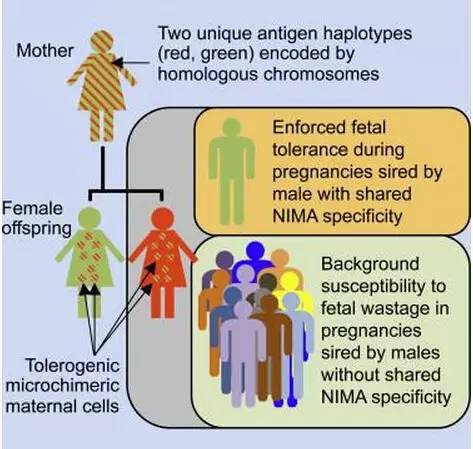

 Now Location:Home--News Center--Industry News
Now Location:Home--News Center--Industry News

Researchers have added a new perspective to the century old Mendelian laws of genetics and biology - they have found that a small group of cells in pregnant mothers enhances genetic fitness and reproductive health for multiple generations. Scientists from the Cincinnati Children's Hospital Medical Center reported their research findings in the July 23rd issue of the journal Cell.
Dr. Sing Sing Way, a senior author of the paper and pediatrician at the Cincinnati Children's Hospital Perinatal Research Institute and Department of Infectious Diseases, said that this study lays a scientific foundation for developing new treatment methods to promote reproductive health and prevent pregnancy complications such as premature birth and stillbirth.
Mendelian genetics believes that reproductive and genetic health is determined by both parents, who each pass on half of their chromosomes to their children. The current research report suggests that women further enhance Mendelian inheritance by retaining some genetically different cells and passing them on to their daughters, granddaughters, and great granddaughters. By preventing the immune system from treating the fetus as an invading pathogen and attacking these cells, it helps to avoid pregnancy complications.
According to researchers, the uniqueness of these maternal cells is that they are microchimeric cells. This means that these cells are genetically different from the mother and her female offspring. These cells prevent the immune system from rejecting the fetus by inducing and regulating T cell recognition and receiving non inherited maternal antigens. This suppresses T cells and prevents immune system attacks.

Way said, "Our data suggests that Mendelian inheritance is enhanced by transmitting these microchimeric cells from mother to offspring. These microchimeric maternal cells can be seen as mother's genetic helpers, and sharing these cells among offspring enhances intergenerational reproductive health."
Serious health challenges
About one in every eight pregnant women will experience pregnancy complications. Premature birth, preeclampsia, and stillbirth remain serious global health issues.
Way said that pregnancy complications usually occur when the mother's immune system mistakenly attacks the developing fetus as an invading pathogen. Using a mouse model for research, the authors found that pregnant mothers who regulate T cell specific recognition of non inherited maternal antigens (NIMA) in the body have significantly improved their ability to resist pregnancy complications。
Although this study was conducted in transgenic mice, Way said the results should be widely applicable to human pregnant women and other mammals that require intrauterine development. In this study, researchers modified mice and tracked microchimeric maternal cells and T cells that recognize NIMA.
The researchers also pointed out that if some NIMA traits of male mice partially overlap with their spouses and their mothers, such mouse pregnancies are particularly resistant to complications.
The Way of Nature
Doctors and scientists know that the body can tolerate non hereditary maternal antigens and can use them to improve the outcomes of solid organ or stem cell transplantation for a period of time.
Way said, "From a basic biological perspective, mammals can develop immune tolerance to non hereditary maternal antigens, so people can successfully receive transplantation, which is obviously very advantageous in this situation. However, there must be a more fundamental biological reason to explain it, which is what we found in this study."
Researchers are further conducting follow-up studies to investigate the mechanism by which retaining maternal cells promotes immune tolerance in offspring. After confirming some molecular details of the natural process of obtaining fetal immune tolerance and preventing pregnancy complications, Way said that new treatment methods can be designed by simulating certain mechanisms to improve reproductive health and human pregnancy outcomes.
Text: Biological Exploration
